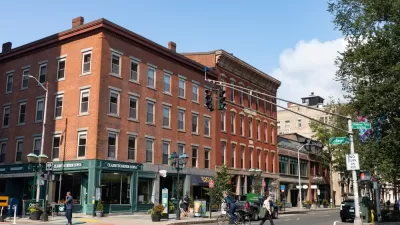A Vox explainer digs into one of the esoteric ideas of planning theory: a land tax.

Jerusalem Demsas writes to explain the potential of a land tax to potentially solve a number of fiscal problems while also creating an incentive for high value development.
Henry George first proposed a land tax in Progress and Poverty (1879), and the idea has hung around more esoteric economic discussions to this day—according to Demsas, the phrase "A land value tax would solve this" appears regularly on Twitter.
While proponents of a land value tax point to numerous fiscal challenges that could be solved with a land value tax, Demsas says one the idea offers a potentially straightforward solution for one of the country's biggest challenges: the cost of housing and the resulting lack of affordable options.
That crisis is caused, in part, by the failure to appropriately use valuable in-demand land for its best purpose. Millions of people want to live in New York City, Los Angeles, Washington, DC, or Seattle, but local tax regimes actually punish people for investing in their property. When people improve their property — either by adding a new room or building an entirely new structure like a multi-story apartment building, they’ll pay higher property taxes.
According to the article, the land tax isn't just an urban solution: small cities with vacant lots could also benefit from balancing the system of incentives. In both urban and more rural settings, according to the theory, under a land value tax, "property owners would be clamoring to be allowed to develop their land more intensely — leading to more homes being built."
The article includes a lot more explanation and links to the most prominent articles written on the subject in the past decade.
FULL STORY: Tax the land

Planetizen Federal Action Tracker
A weekly monitor of how Trump’s orders and actions are impacting planners and planning in America.

Map: Where Senate Republicans Want to Sell Your Public Lands
For public land advocates, the Senate Republicans’ proposal to sell millions of acres of public land in the West is “the biggest fight of their careers.”

Restaurant Patios Were a Pandemic Win — Why Were They so Hard to Keep?
Social distancing requirements and changes in travel patterns prompted cities to pilot new uses for street and sidewalk space. Then it got complicated.

Platform Pilsner: Vancouver Transit Agency Releases... a Beer?
TransLink will receive a portion of every sale of the four-pack.

Toronto Weighs Cheaper Transit, Parking Hikes for Major Events
Special event rates would take effect during large festivals, sports games and concerts to ‘discourage driving, manage congestion and free up space for transit.”

Berlin to Consider Car-Free Zone Larger Than Manhattan
The area bound by the 22-mile Ringbahn would still allow 12 uses of a private automobile per year per person, and several other exemptions.
Urban Design for Planners 1: Software Tools
This six-course series explores essential urban design concepts using open source software and equips planners with the tools they need to participate fully in the urban design process.
Planning for Universal Design
Learn the tools for implementing Universal Design in planning regulations.
Heyer Gruel & Associates PA
JM Goldson LLC
Custer County Colorado
City of Camden Redevelopment Agency
City of Astoria
Transportation Research & Education Center (TREC) at Portland State University
Camden Redevelopment Agency
City of Claremont
Municipality of Princeton (NJ)





























